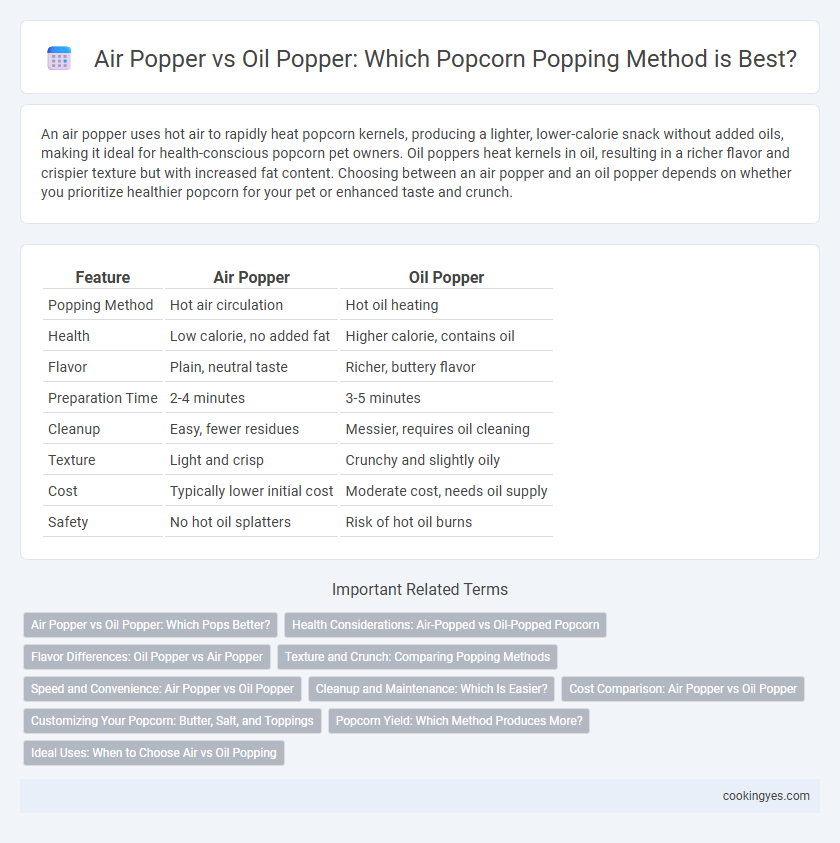An air popper uses hot air to rapidly heat popcorn kernels, producing a lighter, lower-calorie snack without added oils, making it ideal for health-conscious popcorn pet owners. Oil poppers heat kernels in oil, resulting in a richer flavor and crispier texture but with increased fat content. Choosing between an air popper and an oil popper depends on whether you prioritize healthier popcorn for your pet or enhanced taste and crunch.
Table of Comparison
| Feature | Air Popper | Oil Popper |
|---|---|---|
| Popping Method | Hot air circulation | Hot oil heating |
| Health | Low calorie, no added fat | Higher calorie, contains oil |
| Flavor | Plain, neutral taste | Richer, buttery flavor |
| Preparation Time | 2-4 minutes | 3-5 minutes |
| Cleanup | Easy, fewer residues | Messier, requires oil cleaning |
| Texture | Light and crisp | Crunchy and slightly oily |
| Cost | Typically lower initial cost | Moderate cost, needs oil supply |
| Safety | No hot oil splatters | Risk of hot oil burns |
Air Popper vs Oil Popper: Which Pops Better?
Air poppers use hot air to evenly cook popcorn kernels without added fat, producing a lighter, lower-calorie snack with minimal risk of burning. Oil poppers coat kernels in oil, enhancing flavor and crispiness but increasing calories and creating some greasier kernels. Air poppers typically provide a healthier option with a more consistent pop, while oil poppers deliver richer taste and texture, making the best choice dependent on dietary preferences and flavor priorities.
Health Considerations: Air-Popped vs Oil-Popped Popcorn
Air-popped popcorn contains significantly fewer calories and less fat than oil-popped popcorn, making it a healthier choice for weight management. The absence of added oils reduces saturated fat intake, lowering risks associated with heart disease and cholesterol. However, oil-popped popcorn can provide essential fat-soluble vitamins when using healthy oils like olive or coconut, offering a nutritional advantage in moderation.
Flavor Differences: Oil Popper vs Air Popper
Oil poppers enhance popcorn flavor by coating kernels in hot oil, which releases richer, buttery notes and a crispier texture. Air poppers produce a lighter, more natural taste by using hot air without added fat, resulting in popcorn that is lower in calories but less robust in flavor. Choosing between oil and air poppers depends on whether you prioritize a richer taste profile or a healthier, oil-free snack.
Texture and Crunch: Comparing Popping Methods
Air poppers produce popcorn with a lighter, drier texture and a crisp crunch due to hot air circulation, which avoids added oils. Oil poppers create popcorn with a richer, slightly softer texture, and a more substantial crunch because the oil evenly coats kernels, enhancing flavor and mouthfeel. Texture preference often depends on whether consumers prioritize purity and lightness or buttery richness and flavor depth.
Speed and Convenience: Air Popper vs Oil Popper
Air poppers offer rapid popping by circulating hot air, typically producing popcorn in 2 to 4 minutes without the need for oil, enhancing convenience and reducing cleanup. Oil poppers require preheating oil, which extends popping time to around 5 to 7 minutes, but they allow for added flavor and a crispier texture. The air popper's speed and ease of use make it ideal for quick, healthy snacks, while oil poppers cater to those prioritizing taste and traditional preparation.
Cleanup and Maintenance: Which Is Easier?
Air poppers generate popcorn using hot air, resulting in minimal residue and simple cleanup mainly from leftover kernels, while oil poppers leave behind grease that requires thorough washing. The absence of oil in air poppers reduces the risk of stubborn buildup, making maintenance quicker and less labor-intensive. For users prioritizing ease of cleaning and less frequent deep maintenance, air poppers prove to be the more convenient choice.
Cost Comparison: Air Popper vs Oil Popper
Air poppers offer a cost-effective solution by requiring no additional oil or butter, reducing ongoing expenses and maintenance. Oil poppers tend to have higher upfront costs and continuous expenditure on oil, but they provide richer flavor options. Evaluating energy consumption, air poppers are generally more energy-efficient, contributing to lower utility bills over time.
Customizing Your Popcorn: Butter, Salt, and Toppings
Air poppers produce popcorn with minimal oil, allowing full control over butter, salt, and toppings application, resulting in a lighter, customizable snack. Oil poppers incorporate oil during popping, infusing flavor directly into the kernels but may limit customization options due to added fat content. Choosing between air and oil popping methods depends on personal preferences for texture and the flexibility to tailor seasoning intensity and variety.
Popcorn Yield: Which Method Produces More?
Air poppers typically produce a higher popcorn yield compared to oil poppers because they use hot air to evenly and efficiently pop kernels without the added weight or moisture of oil. Oil poppers can yield slightly fewer popped kernels since the oil may cause some kernels to pop unevenly or stick together, reducing the overall volume. For maximizing popcorn yield, air popping is generally considered the more effective method.
Ideal Uses: When to Choose Air vs Oil Popping
Air poppers are ideal for health-conscious individuals seeking low-calorie popcorn with minimal added fat, perfect for guilt-free snacking and easy seasoning absorption. Oil poppers suit users looking for richer flavor and a traditional texture, ideal for making buttery, savory popcorn with enhanced crispiness. Choosing between them depends on dietary preferences and desired taste, with air poppers emphasizing health benefits and oil poppers delivering classic flavor profiles.
Air popper vs Oil popper for popping method Infographic

 cookingyes.com
cookingyes.com